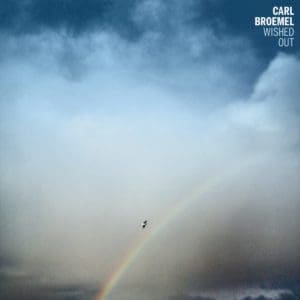
Carl Broemel is at the top of his game right now. In addition to playing lead guitar, lap steel, and saxophone in the ever-popular My Morning Jacket, he also has a thriving solo career. Today (September 21), he drops his latest record, Wished Out. Next week he will be a part of the first-ever Sea. Hear. Now Music and Art Festival in Asbury Park, New Jersey. It is in conjunction with this festival that I was lucky enough to get him to answers a few of my questions about his newest album, Wished Out, his playing style, the changing musical landscape, and more.
Can you break down your newest album, Wished Out, a little bit, in terms of the themes, any unusual recording techniques, personnel, etc.? What can you tell me that was different about putting it together vs. your previous records?
Usually I will record at a larger studio in Nashville, but this album I made entirely at my home studio. It’s all in one room. My initial idea was that I would attempt to play everything myself. I engineered the whole thing as well, and so as I got more comfortable with how things were sounding, I could branch out.
On [the song] “Out of Reach” I played everything aside from the keyboard parts which Bo Koster from My Morning Jacket played. It took me forever to get the drums right on that song, so I recruited my pal Russ Pollard to help me with drums from there on out. I also roped in Tom Blankenship from MMJ to play bass and Robbie Crowell to play keyboards on the rest of the songs.
I really like sending microphones into guitar effects before they are recorded. On “Malibu Shadow,” I sent the piano mics through a tape echo. While Robbie was playing, i was increasing the delays and feedback depending upon what he was playing.
Do you find that your playing style changes depending on the musicians around you? Or do you tend to stay the course for the most part?
Yes, I think it does change depending on who is around you. I try to be open to changing anything about the song as we are recording it. Having some trusted friends involved can push a song into a totally different style than you would have initially thought would work.
How would you say your playing has evolved in your time as an artist?
As far back as I can remember I have always been finding new guitarists and albums to obsess over, and this has definitely seeped into how I play. When I was a kid I was into classic rock — Van Halen, then REM, then the Smiths, then Fugazi, then classical guitar players Ida Presti and Segovia, then Neil Young, Joni Mitchell, then Nick Drake, then Clarence White, then Jerry Garcia…then Thelonius Monk.
What have you noticed that has changed about your songwriting on this newest album specifically, if anything? Was there anything you had been wanting to try for a while that you got to make a reality?
I really tried to inject more energy into the music. I have already recorded my fair share of dreamy mellow music, so I tried to push myself to amp it up a bit. I know this record could also be seen as dreamy and mellow at times, but not compared to what i have done before.
What have been some of the major changes in the musical landscape that you’ve noticed in your time as a working musician?
The most amazing thing to witness has been the parade of music mediums…back in the day vinyl sounded really great, then cassette tapes came out and wiped out LPS, then when tapes finally started sounding great (because of Dolby and better equipment), CD’s came out and wiped out cassettes. CD technology got pretty advanced, then horrible sounding Mp3s took over, and now we’ve listened to compressed Mp3 and streaming audio for so long that we can’t tell how bad they sound! Our ears have simply forgotten! Thankfully you can still put on a vinyl record, or even a CD and you breathe a sigh of relief. You remember that music can sound great, you just have to work for it.
At least the live music world is still as valuable and viable as it ever has been. There still is no substitute to going to a live concert. If this goes away it will be virtually impossible to continue making music, because the streaming revenues are absolutely unfair to the artists.
It feels like bands and artists have to diversify kind of like the record stores did to survive at all. Most record stores I’ve been to over the last 10 years sell a lot more items besides the actual music. So I guess that is what we have to do now? It’s frustrating because I’d like to just focus on the songs and recording, but to keep that going you have to have other things available. For me, at the end of the day, the most enjoyable thing of all has always been to walk on stage and play music with my friends.
If there is a central theme or message to Wished Out, what would you say it is?
For me the meaning of “wished out” is that it is okay to be disappointed and unhappy about how things are going. But at some point, to get anywhere at all, you have to stop and step outside of yourself — try to take responsibility for the situation, and do something about it.
Any additional information you feel is relevant, or anything you feel I should’ve asked, anything you want to get out there?
In addition to playing a set at Sea.Hear. Now, I am also showing some polaroid photographs I have taken while on tour at the pop up art show at the festival.


